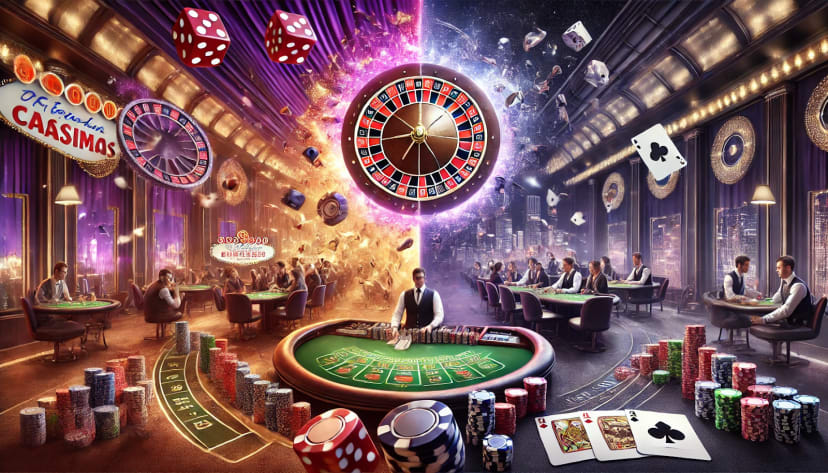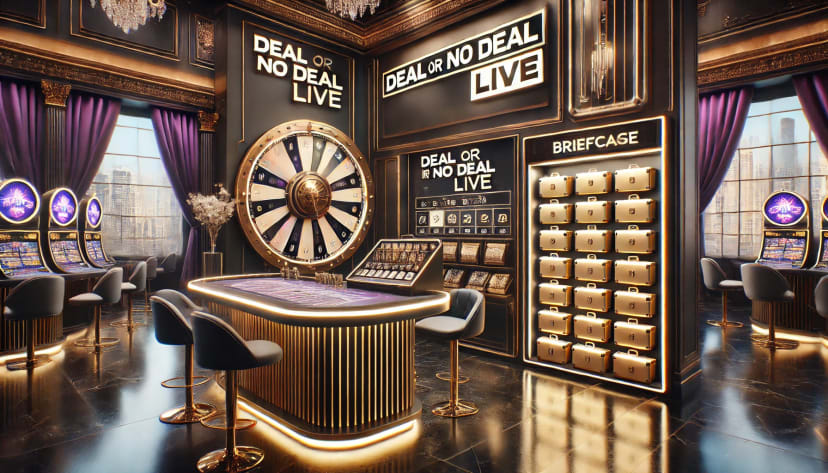Are Live Casino Games Threatening the Existence of RNG Games?

The online gambling landscape has undergone a remarkable transformation over the past decade. What began as a digital adaptation of traditional casino games through random number generators (RNG) has evolved into sophisticated live-streamed experiences featuring real dealers and physical equipment. This evolution represents more than just a technological advancement—it signals a fundamental shift in how players engage with online gambling platforms and raises important questions about the future of RNG-based games that have been the backbone of online casinos since their inception.
The Evolution from RNG to Real-Time Streaming
The journey from basic RNG games to today's immersive live casino experiences has been marked by several technological milestones. Early live dealer games emerged around 2003 but were limited by bandwidth constraints and primitive streaming technology. The experience was often choppy, with low-resolution video and frequent disconnections.
The evolution of live dealer technology can be traced through these key developments:
- 2003-2006: First-generation live dealer games appear with basic single-camera setups
- 2007-2010: Multi-camera systems introduced, allowing different viewing angles
- 2011-2014: HD streaming becomes standard as bandwidth limitations decrease
- 2015-2018: Mobile optimization transforms accessibility and user experience
- 2019-2022: Game show formats emerge, blending live dealing with entertainment elements
- 2023-2025: AR/VR integration begins, creating hybrid immersive experiences
This progression has transformed what was once a niche offering into a dominant force in the online gambling ecosystem. Today's live casino studios feature broadcast-quality production values, multiple camera angles, and interactive elements that were unimaginable in the early days of online gambling.
Why the Question Matters in 2025
The question of whether live casino games threaten RNG games has significant implications for the entire gambling industry in 2025. Market research indicates that live dealer segments are growing at 15% annually compared to 7% for traditional RNG games. Major operators now allocate up to 40% of their marketing budgets to live casino promotions, signaling a strategic pivot toward these offerings.
Player preferences have shifted dramatically as well. According to recent surveys:
- 62% of players under 35 prefer live dealer games to RNG alternatives
- Session times are 2.3x longer in live dealer environments
- Average bet sizes are 30% higher in live dealer games compared to their RNG counterparts
These trends have forced operators to reconsider their game portfolios and resource allocation. For technology providers and game developers, the question influences R&D priorities and product roadmaps. For regulators, the rise of live dealer games presents new challenges in ensuring fair play and responsible gambling measures.
Player Behavior Shifts: Engagement and Experience
Interactivity and Realism in Player Retention
Live casino games have revolutionized player engagement through human interaction and authentic casino atmospheres. Players can chat with dealers and fellow participants, creating a social dimension previously absent from online gambling. This social element addresses one of the most significant criticisms of online gambling—its isolation compared to brick-and-mortar casinos.
The psychological impact of seeing physical cards dealt or a real roulette wheel spinning cannot be understated. Studies show that players trust live games more than their RNG counterparts, with 74% of surveyed players indicating higher confidence in the fairness of live games despite both formats being subject to rigorous testing. This perception drives longer session times and higher player loyalty metrics.
Live dealer providers have capitalized on this by enhancing dealer training programs. Dealers now receive extensive coaching not only in game procedures but also in player engagement techniques, creating personalities and brands around specific dealers who develop followings among players.
Convenience and Control in RNG Formats
Despite the surge in live casino popularity, RNG games retain significant advantages in convenience and player control. These games operate 24/7 without staffing requirements, allowing players to enjoy their favorite titles at any time without waiting for seats. The pace of play remains entirely in the player's hands—a crucial factor for many gambling enthusiasts.
RNG games also offer advantages in these key areas:
- Privacy and anonymity for players who prefer solitary gaming experiences
- Significantly faster gameplay with no dealer pacing or other player actions to wait for
- Lower minimum betting limits, making them more accessible to casual players
- Perfect for mobile play in situations with unstable internet connections
- Ability to play in practice mode before committing real money
These factors ensure that RNG games maintain a dedicated player base even as live casino options expand. For many players, particularly those seeking quick gaming sessions during commutes or breaks, the immediacy of RNG games remains compelling.
Game Design and Innovation Cycles
How Live Games Are Evolving Faster
The innovation pace within live casino formats has accelerated dramatically, outpacing traditional RNG development cycles. Game show hybrids like "Crazy Time" and "Monopoly Live" have created entirely new categories that blend gambling with entertainment elements reminiscent of television game shows.
These innovations extend beyond mere visual enhancements to include:
- Multiplier mechanics that dramatically increase potential payouts
- Bonus rounds requiring player decisions and interaction
- Augmented reality elements overlaid on physical game components
- Multi-game environments where players can participate in several games simultaneously
- Seasonal and themed limited-time versions of popular games
The production value of these offerings continues to increase, with Evolution Gaming's "Gonzo's Treasure Hunt Live" representing one of the first successful mergers of a popular RNG slot character with a live dealer format. This cross-pollination suggests that the boundaries between live and RNG games may become increasingly blurred.
Are RNG Games Stagnating or Adapting?
Contrary to assumptions that RNG games are stagnating, significant innovation continues in this space, albeit in different directions. The transition to HTML5 technology has revitalized older titles, making them compatible with modern devices and introducing new features impossible in earlier formats.
RNG innovation has focused on these areas:
| Innovation Area | Examples | Player Impact |
|---|---|---|
| Mechanics | Megaways, Cluster Pays, Infinity Reels | New ways to win beyond traditional paylines |
| Volatility Options | Player-selectable variance levels | Customized risk/reward profiles |
| Narrative Elements | Story progression, character development | Deeper player investment in game outcomes |
| Social Features | Tournaments, leaderboards, shared bonus rounds | Community engagement without direct interaction |
| Cross-platform Integration | Synchronized progress across devices | Seamless play transitions from desktop to mobile |
These developments demonstrate that RNG games are not standing still but evolving along a parallel track that emphasizes different player preferences and technological capabilities. The question remains whether these innovations can sustain player interest against the backdrop of increasingly sophisticated live offerings.
Platform and Operator Economics
Revenue Generation Per Player
The economic realities of live dealer versus RNG games present operators with complex considerations. Live dealer games generate significantly higher revenue per player, with average session values 2.7 times higher than comparable RNG alternatives. This revenue advantage stems from multiple factors including longer engagement times, higher minimum bets, and the psychological impact of social pressure when playing with real dealers and other participants.
Time-on-site metrics show particular divergence:
- Average RNG slot session: 18 minutes
- Average RNG table game session: 22 minutes
- Average live dealer session: 52 minutes
This extended engagement translates directly to higher revenue, with players making more bets over longer periods. Additionally, the immersive nature of live dealer games reduces the likelihood of players multi-tabling or splitting attention across multiple sites, keeping them focused on a single operator's offerings.
Cost to Host and Maintain
While live dealer games generate higher revenue per player, they also incur substantially higher operational costs. Maintaining live dealer studios requires:
- Physical studio space with sophisticated lighting and acoustics
- Broadcasting equipment and high-bandwidth streaming infrastructure
- Trained dealers working in shifts to provide 24/7 coverage
- Technical support staff to address real-time issues
- Game equipment maintenance and replacement
These expenses create a higher break-even threshold for live dealer games. In contrast, RNG games offer nearly unlimited scalability—once developed, they can serve millions of players simultaneously with minimal additional infrastructure costs. This scalability makes RNG games particularly valuable for smaller operators or those entering new markets where player volumes may initially be low.
Regulatory and Licensing Considerations
RNG Compliance and Certification
RNG games operate under well-established regulatory frameworks that have evolved over decades. These games undergo rigorous mathematical testing by independent laboratories like Gaming Laboratories International (GLI) and iTech Labs to verify randomness and expected return-to-player percentages.
The certification process typically involves:
- Source code reviews to identify potential vulnerabilities
- Statistical analysis of millions of simulated game outcomes
- Periodic retesting to ensure ongoing compliance
- Verification of game rules and paytable accuracy
This established framework provides regulatory clarity for operators and confidence for players. The mathematical nature of RNG testing also allows for precise calculation of house edges and volatility profiles, giving players transparent information about game characteristics.
Live Game Audits and Oversight
Live dealer games present unique regulatory challenges that have required adaptation of existing frameworks. Rather than focusing exclusively on random number generation, regulators must consider the integrity of physical equipment, dealer training, and real-time monitoring systems.
Regulatory approaches have evolved to include:
- Camera systems that monitor all dealer actions
- Automated card recognition technology to verify hand outcomes
- Regular physical inspection of equipment like roulette wheels and card shoes
- Dealer training certification and ongoing performance monitoring
- Incident response protocols for disputes or technical failures
These measures add complexity to compliance efforts but have proven effective in maintaining game integrity. Regulators in major jurisdictions now have specialized divisions focused on live dealer oversight, reflecting the growing importance of this segment.
Conclusion: Will RNG Games Survive the Live Casino Boom?
The evidence suggests that the future of online gambling will feature both live and RNG formats evolving in parallel rather than one replacing the other. The question is less about survival and more about adaptation and specialization. RNG games are likely to continue evolving toward experiences that capitalize on their unique strengths—privacy, pace control, complex mathematics, and unlimited scalability.
For players, this parallel evolution promises richer and more diverse gambling experiences. For operators, it necessitates sophisticated multi-product strategies rather than all-or-nothing bets on either format. The question is not whether RNG games will survive, but how both formats will transform as they respond to evolving player expectations and technological capabilities.
FAQ
What Are Live Casino Games and How Do They Differ from RNG Games?
Live casino games use real dealers, physical cards, and live-streaming technology to simulate a land-based casino experience online. In contrast, RNG (Random Number Generator) games rely on algorithmic software to produce random outcomes. Live games provide a more social and immersive experience, while RNG games offer speed, privacy, and flexibility.
Are Live Casino Games Replacing RNG Games?
No, live casino games are not replacing RNG games but rather complementing them. While live games are gaining popularity due to their interactive and realistic features, RNG games remain relevant due to their convenience, faster pace, and suitability for mobile play. Both formats are evolving to meet different player preferences.
Why Do Players Prefer Live Casino Games in 2025?
Players in 2025 prefer live casino games primarily due to increased trust, realism, and social interaction. Survey data shows that 62% of players under 35 favor live dealers. The presence of real people and physical gaming elements increases confidence in fairness, enhances engagement, and results in longer session times and higher betting volumes.
How Are RNG Games Adapting to Stay Competitive?
RNG games are evolving through innovations in game mechanics (e.g., Megaways, Cluster Pays), volatility customization, narrative features, and social elements like tournaments and leaderboards. Additionally, HTML5 upgrades and cross-device compatibility ensure modern, flexible play that appeals to a tech-savvy audience.
What Are the Financial and Operational Differences Between Live and RNG Games?
Live games generate more revenue per player due to higher engagement and bet sizes but also incur higher costs for staffing, studios, and streaming infrastructure. RNG games, on the other hand, offer lower operational costs and high scalability, making them ideal for operators with limited resources or targeting mass-market audiences.
















